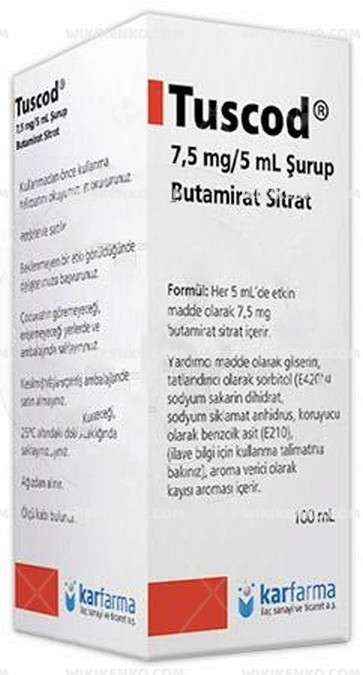Description
Introduction
Tuscod stands as a beacon of relief, a syrup fortified with the potent butamirat citrate as its active ingredient. This marvel belongs to the category of cough suppressants, tailored to alleviate the discomfort of dry coughs.
Ingredients
- Composition: Central to Tuscod’s effectiveness is its active ingredient, butamirat citrate.
- Classification: It earns its place as a cough suppressant, specifically targeting dry, non-productive coughs.
- Form: Available in amber-colored glass bottles of both 100 ml and 200 ml variants, each carton of this syrup boasts a 5 ml measuring spoon.
Usage
Unlocking the power of Tuscod is marked by precision and adherence:
- Treatment Duration: The maximum span of treatment sans medical prescription is one week.
- Adult Dosage: For adults, embrace a dosage of 15 mL, taken four times daily.
- Children Aged 3 to 6: Children in the 3 to 6-year age bracket should take 5 mL thrice daily.
- Children Aged 6 to 12: Those aged 6 to 12 years find comfort in a 10 mL dose thrice daily.
- Adolescents Over 12: Adolescents beyond 12 years of age are recommended a 15 mL dosage thrice daily.
Precautions
Tuscod beckons users to navigate its usage responsibly:
- Allergies: Individuals allergic to butamirat or any other syrup component should refrain from its use.
- Age Restriction: Children below the age of 3 must avoid it.
- Other Medications: Caution is essential when co-administering with other expectorant medications.
Side Effects
While Tuscod extends relief, it can occasionally usher in side effects, albeit rarely. Such effects might encompass:
- Drowsiness
- Nausea
- Diarrhea
- Urticaria (hives)
Storage
Storing Tuscod in its prime condition is achieved through these steps:
- Preserve the original packaging.
- Maintain it at room temperature.
- Shield it from light and moisture.
Alternatives for Dry Cough Relief
Inquiry often surrounds alternatives to Tuscod for dry cough alleviation. Several over-the-counter options await:
- Cough Suppressants: Dextromethorphan, a common cough suppressant, is found in various formulations.
- Decongestants: These tackle the root of coughing caused by nasal congestion. Pseudoephedrine, a typical decongestant, finds a place in multiple medications.
- Lozenges: These offer targeted relief, often infused with soothing ingredients.
Conclusion
Tuscod emerges as an ally in the battle against dry coughs. Armed with butamirat citrate, it extends comfort while maintaining a delicate balance between efficacy and safety. Before embarking on any relief journey, consulting with healthcare professionals is the cornerstone of a secure path.











Reviews
There are no reviews yet.